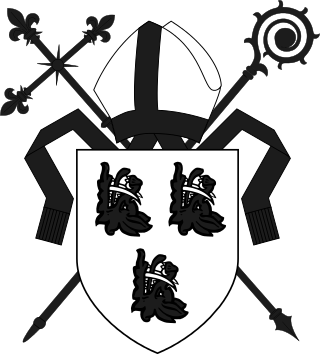Related Research Articles

Thomas Bourchier was a medieval English cardinal, Archbishop of Canterbury, and Lord Chancellor of England.
Roger Walden was an English treasurer and Bishop of London.
William Courtenay was Archbishop of Canterbury (1381–1396), having previously been Bishop of Hereford and Bishop of London.

Samuel Daniel (1562–1619) was an English poet, playwright and historian in the late-Elizabethan and early-Jacobean eras. He was an innovator in a wide range of literary genres. His best-known works are the sonnet cycle Delia, the epic poem The Civil Wars Between the Houses of Lancaster and York, the dialogue in verse Musophilus, and the essay on English poetry A Defence of Rhyme. He was considered one of the preeminent authors of his time and his works had a significant influence on contemporary writers, including William Shakespeare. Daniel's writings continued to influence authors for centuries after his death, especially the Romantic poets Samuel Taylor Coleridge and William Wordsworth. C. S. Lewis called Daniel "the most interesting man of letters" whom the sixteenth century produced in England.
John de Halton, also called John de Halghton, was an English priest and Bishop of Carlisle from 1292 to 1324.
William Strickland was an English priest and sometime Rector of St. Mary's Church, Horncastle who served as Bishop of Carlisle from 1400 until 1419. He was appointed by Pope Boniface IX, but not initially accepted by King Henry IV, although he did confirm the appointment after the chapter had elected him. He was consecrated on 15 August 1400. Strickland was one of the commissioners who negotiated peace with Scotland in 1401.
Nicholas Close was an English priest.
The Bishop of Carlisle is the Ordinary of the Church of England Diocese of Carlisle in the Province of York.
Robert Waldby was a native of York and friar of the Order of Saint Augustine who followed Edward, the Black Prince into Aquitaine, and undertook a number of diplomatic missions on his behalf. After studying at Toulouse, he became professor of theology there. He later became close to Edward's son, King Richard II. He was a firm opponent of John Wycliffe, wrote a book denouncing him, and was a member of the Synod which assembled at Oxford in 1382 to judge his orthodoxy.

Lawrence Booth served as bishop of Durham and lord chancellor of England, before being appointed archbishop of York.
Richard FitzNeal was a churchman and bureaucrat in the service of Henry II of England.

John Waltham was a priest and high-ranking government official in England in the 14th century. He held a number of ecclesiastical and civic positions during the reigns of King Edward III and Richard II, eventually rising to become Lord High Treasurer, Lord Privy Seal of England and Bishop of Salisbury. He is buried in Westminster Abbey, London.
Ralph Ergham was the English bishop of Salisbury from 1375 to 1388, and then bishop of Bath and Wells from 1388 to 1400.
Nicholas Bubwith (1355-1424) was a Bishop of London, Bishop of Salisbury and Bishop of Bath and Wells as well as Lord Privy Seal and Lord High Treasurer of England.
Ralph of Irton was a medieval Bishop of Carlisle.
William Percy was a late medieval Bishop of Carlisle. He was the fifth son of Henry Percy, 2nd Earl of Northumberland, and his wife Lady Eleanor Neville. Percy was in 1451 appointed to be Chancellor of the University of Cambridge, a post he held until 1456. He was selected 30 August 1452 to be Bishop of Carlisle following the appointment of his predecessor Nicholas Close to the Bishopric of Coventry and Lichfield. Percy was consecrated between 16 November and 18 December 1452. He died on 26 April 1462.
Robert Braybrooke (1336/7-1404) was a medieval cleric and King's Secretary. He was Dean of Salisbury and Bishop of London.
John Bottlesham was a medieval Bishop of Rochester.
Richard le Scrope was an English cleric who served as Bishop of Coventry and Lichfield and Archbishop of York and was executed in 1405 for his participation in the Northern Rising against King Henry IV.
Richard Payl was a 15th-century Dominican friar. He served firstly as the Bishop of Dromore before becoming the Bishop of Mann and The Isles.
References
- Daniel, Samuel (1958). Michel, Laurence (ed.). The Civil Wars. New Haven, CT: Yale University Press. OCLC 1069431467.
- Fryde, E. B.; Greenway, D. E.; Porter, S.; Roy, I. (1996). Handbook of British Chronology (Third revised ed.). Cambridge, UK: Cambridge University Press. ISBN 0-521-56350-X.
- Shakespeare, William (2002). Forker, Charles R. (ed.). King Richard II. London: Thompson Learning. ISBN 1-903436-33-8. OCLC 704040543.